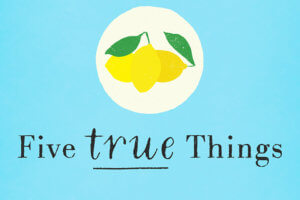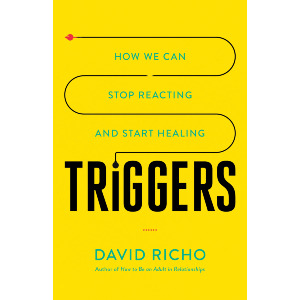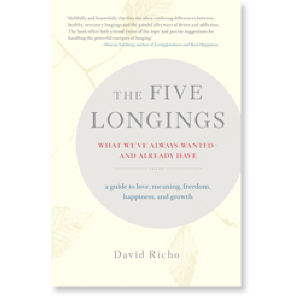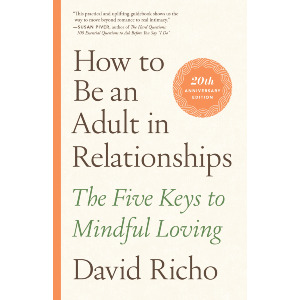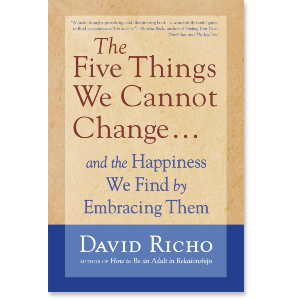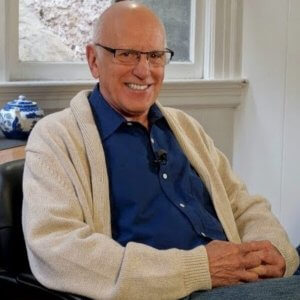Excerpt from Five True Things
For all that has been: Thanks!
For all that shall be: Yes!
—Dag Hammarskjöld, Markings
In the early 1940s, on the night of her graduation party, a high school girl named Doris Van Kappelhoff was involved in a serious car accident. She had planned to go to Hollywood to become a dancer in films, but her injuries made that future no longer possible. Doris, during her long homebound recuperation, began to sing along with the female vocalists on the radio. Her voice became so well trained that she was hired to sing in a band, and soon thereafter, she found parts in movies, changing her name to Doris Day. Her original plans were dashed by a tragic event, but thereby she found her true calling. Things don’t always go according to our plans, but a change of plans may be an example of synchronicity, the mysterious set of coincidental circumstances that lead us to a life fulfillment unguessed and unsought—other words for grace.
We make plans expecting to be in control of what will happen. Perhaps we fear natural happenings, things turning out contrary to our wishes. We are challenged by life’s “mind of its own” to let go of having things come out our way. This is about control. We may act with precision, and self-discipline, expecting the world to follow suit and grant us our reward.
Perfect discipline, or perfect control, is the best way to miss out on the joy of life. The unruly givens of life are permissions not to be perfect. We can flow into the natural chaos of life—so untidy, so unpredictable—or we can try to order life fully by making careful plans. But as Robert Burns says to a mouse: “The best-laid schemes of mice and men oft go astray and leave us naught but grief and pain for promised joy.” We know now that a yes to life is a yes to grief and pain, since all the conditions of existence represent losses and disappointments. Yes is a healthy response to the human condition.
To grow into adulthood means that we accept the givens of life as they are, and this helps us accept ourselves as we are.
Making plans is an adult occupation, a feature of the healthy ego. In fact, though, life often does not proceed according to our plans. This does not have to leave us crestfallen. It can make us excited that something spiritual—that is, unconjured by ego—may be afoot. Perhaps we believe the universe has a plan that more accurately reflects our emerging destiny. Perhaps we believe there is no plan at all and “them’s the breaks.” As adults we do not console ourselves with promises of a silver lining on every cloud or a Shangri-la in any land. Our comfort is in our commitment to deal with what happens and make the best of it. Or are we angry that the givens make us keep having to grow up?
To grow into adulthood means that we accept the givens of life as they are, and this helps us accept ourselves as we are. Being an adult means living with life’s conditions in an allowing way.
Maybe we don’t fit psychology’s definition of “well-adjusted,” or maybe we didn’t benefit from healthy emotional development. We did not have a perfect childhood or a perfect adolescence, and we are not having a perfect adulthood. All our investments are not paying off. All our hopes for the future are not coming true. Life is unpredictable and not at our beck and call. Can that become palatable? Can that be appreciated as somehow useful to our becoming people of character, depth, and compassion? Then to complain is to have missed the point.
In a world in which I may not do or finish anything perfectly or get anything permanently right, it makes sense to let go of the need for perfection. The Bhagavad Gita says: “Even a little progress is complete freedom from fear.” Can I be satisfied with that as my style? As long as I am doing my best most of the time and can let things happen as they happen and then do the best I can with them, I am perfectly human, and that is a supreme achievement. The alternative is hubris: “I can always get it right; I am better than other people.” Enlightenment is ordinariness loved, amor fati. It is saying: “I let go of more than any fate can take.”
Error and errancy are not tragedies. They are ingredients of and directions to discovery. They show us paths that humble us, startle us, and point us to new horizons. They do not have to lead to regret or shame. We say yes to our imperfection and accept our mistakes. We learn not to do it that way next time. Mistakes are not a sign of stupidity. They are human ways of learning. Recalling our big mistakes in life is a way of staying humble, the virtuous flower that blooms from the bud of yes. Humility leads us to commit ourselves to admitting our mistakes and making amends for anything we have done that may have hurt others. Such humility is a bridge to the letting go of regret.
We exist because of a beatific vision: the divine is focusing into time and space, and we are focusing back.
Things are not always as we would like them to be, nor do plans always work out our way. The fact that we are not in control means that the proper bearing for life on the raft of this floating world is surrender to what is as it is, how it is, when or where it is. We can fight with all our might for what can be changed, but only surrender works with what cannot be changed. The fact that we are not in control and that things happen that we neither sought nor planned means that there are forces at work bigger than our egos. This given is thus an intimation of divinity, as Ralph Waldo Emerson says: “So nigh is grandeur to our dust.”
What is the divine? It may be Something—we know not what or whom, we know not how or when—that is always at work, but we do know why: so we can fulfill our destiny to become unique exemplars of love and wisdom. The divine is the life force of the living universe that yearns to articulate itself in all of us. The finite is a unique moment of focus on the timeless infinite. We exist because of a beatific vision: the divine is focusing into time and space, and we are focusing back. When the divine arrives here, it is I, and when it reaches there, it is you, and when it lands outside my window, it is that fig tree under which Buddha was enlightened, sitting quietly in an attitude of yes for a long time.
Evolutionary Conditions
The conditions of existence are our open sesames to evolution. Nature—and we—join to say yes unconditionally to an expanded version of the five givens. Here is a list that shows what the givens of our lives look like when they happen in and to nature. Evolution is nature’s plan, but it is not quite knowable. There is an order and balance in our universe that coexists with a formidable unpredictability beyond human control.
In the givens that follow ask yourself how each of them applies to your present way of living your life:
- Everything changes and passes from one form to another.
- Matter, like spirit, is neither created nor destroyed but evolves in transformational seasons of beginning, growing, cresting, harvesting, dying, and renewing.
- The universe, like the human soul, is both finite and infinite.
- There is no single reliable configuration of how things are or how they are supposed to be or how they will turn out. Instead, there is infinite and unending possibility, just what animates our own souls.
- Events do not always line up in accord with the human version of order.
- Nothing and no one is truly separate; all is intricately and necessarily interconnected.
- Everything is zealously engaged in becoming what it is. Everything is becoming what it is meant to become no matter what the interferences or odds.
- Nothing is ever complete or finished. Everything is a work in progress, especially ourself.
- All beings in nature are subject to time by reason of birth and death.
- We are all continually evolving—taking on the new and letting go of the old—to fit the changing conditions of the environment. We evolve because of changes such as birth and death.
- The past of things and people strongly influences their present condition, yet it does not have to determine their future.
- Love, wisdom, and healing endure as driving forces both in our human stories and in the story of the universe. Simultaneously, nature is driven by destructive forces that are necessary for the survival of us all.
- When we intuit a truth of the universe, we feel a bodily resonance: it “feels right.” We are clicking into the archetypal code of our humanity, and it matches the evolutionary code of the universe.
- The center of both the universe and the psyche is a single movable feast, and the circumference is nowhere to be found.
Would but some wingéd Angel ere too late
Arrest the yet unfolded Roll of Fate,
And make the stern Recorder otherwise
Enregister, or quite obliterate!
Ah, Love! could you and I with Him conspire
To grasp this sorry Scheme of Things entire,
Would not we shatter it to bits—and then
Re-mould it nearer to the Heart’s Desire!
—The Rubáiyát of Omar Khayyám
(translated by Edward FitzGerald)
It All Balances in Love
Our personal plans work best when they align with a larger plan. This happens when we live not only for ourselves and our loved ones but for the world as well. Loving-kindness fosters this responsiveness to a universal caring. We extend our concern beyond our immediate circle to a universe without circumference. Nature does this too, in that it tailors each species to support others. Shakespeare reminds us in The Merchant of Venice that “such harmony is in immortal souls,” and loving-kindness is a purposeful expression of it.
The balance of nature is not always harmonious, however. It includes room for occasional confusion and disorder. We notice that same chaos in our own lives, no matter how devoted we are to spiritual practices and how earnestly we do our psychological work. Yet there is something in us too, something that is never spent and that irrepressibly survives the tumult of life. This something is the energy that contains us and the universe. This life force, the most reassuring given, is something that endures in us, through us, and beyond us, undamaged and integral, no matter what may have happened to us in the course of our lives.
To grow into adulthood means that we accept the givens of life as they are, and this helps us accept ourselves as we are.
We make the effort to engage in spiritual practices, and then shifts follow that take us beyond the limitations of our ego. These shifts are supplemental graces, personified by the assisting forces in the hero stories. In most tales, the hero or heroine performs his or her task only with the aid of kindly forces, as, for example, Dorothy was helped by the scarecrow, the tin man, and the lion. This is another example of how interconnectedness is such a necessary ingredient for human growth. Assisting forces turn the scared ego into a champion of love, the ignorant ego into a mentor of wisdom, the broken ego into a miracle worker. Nature then holds the ego tenderly, and the ego relaxes and lets itself be held. That is the felt meaning and promise of a balance of person and world, of ego and archetype, of human and divine energies. The ego always wanted to be held like this, no matter how fierce its kicking and screaming.
There are balances we cannot effect or even imagine but that happen when love takes us one step beyond fear. The reason love casts out fear is that love creates the feeling of safety. When we act with love, we feel so good about ourselves that courage blooms. We find the poise to be at home with givens that scared us before. They bless us with the gifts of the unconditioned universal Self: believing in our powers and being comfortable with them, letting go of control, practicing loving-kindness, surrendering to this startling moment, daring defiantly to break through the gates that say “Keep out” or “Don’t go beyond this point.”
May I trust the forces that help me know who I am and where I am going, and may all those who doubt themselves and disregard their destiny likewise be surrounded by inescapable evidence of their limitless identity and destiny.
Share
Related Books
$17.95 - Paperback
$21.95 - Paperback
How to Be an Adult in Relationships
$18.95 - Paperback
The Five Things We Cannot Change
$14.95 - Paperback
David Richo, PhD, is a psychotherapist, teacher, writer, and workshop leader whose work emphasizes the benefits of mindfulness and loving-kindness in personal growth and emotional well-being. He is the author of numerous books, including How to Be an Adult in Relationships and The Five Things We Cannot Change. He lives in Santa Barbara and San Francisco, California. Learn more.


